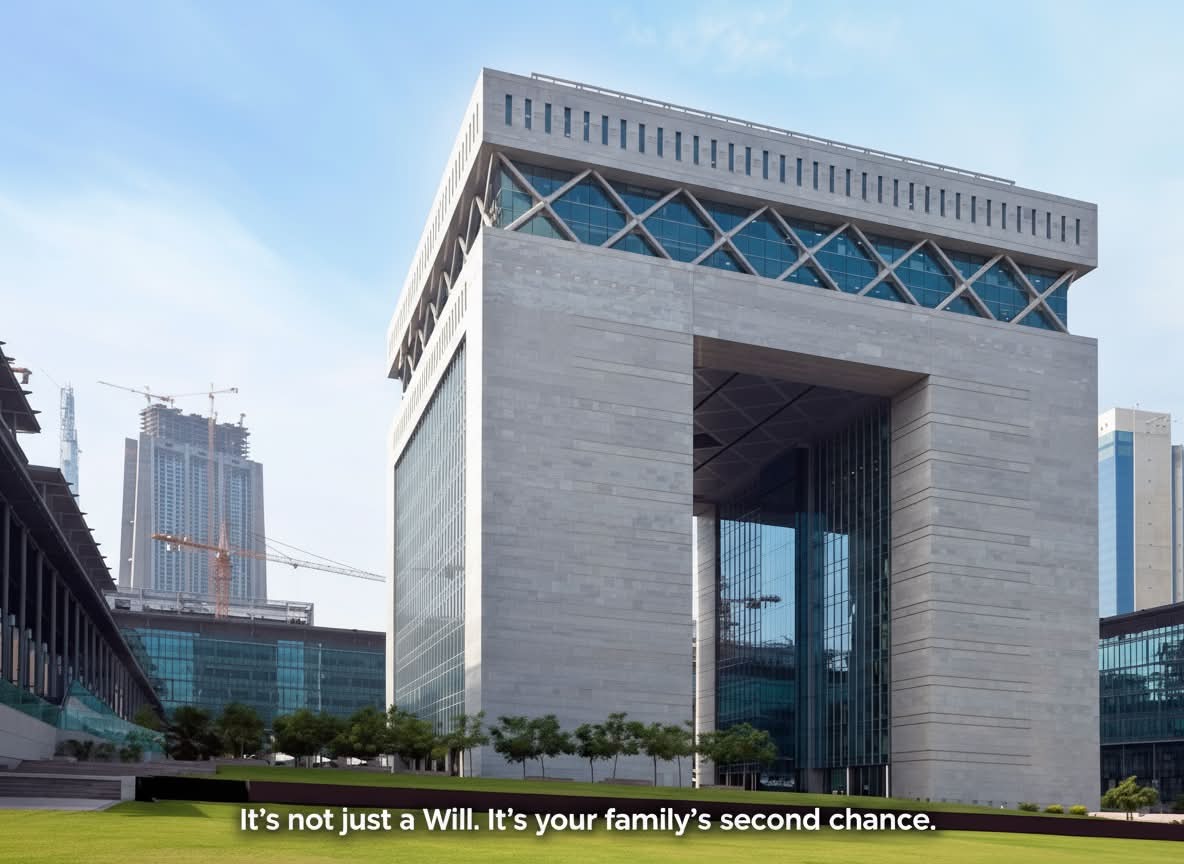The Wilsons: A Family Undone
A cautionary tale from Dubai, 2023 — and how everything changed in 2025
TLDR: The Wilsons
British expats Michael and Emma Wilson died in Dubai in 2023 without a DIFC Will, triggering an 18-month nightmare: all assets frozen, £47,000 in legal fees, Dubai Civil Courts applying Sharia law (their son inherited twice what their daughter received), and seven-way property splits across three countries. If they'd died after January 2025 with a DIFC Will, everything would have been different...
Read their full story and learn how to protect your assets and your family. Don't let this happen to the people you love...
Part One: The Call
Sarah Wilson was folding laundry in their Maidenhead home when her phone rang. It was 11:47 PM on a Tuesday in March 2023.
"Mrs. Wilson?" The voice was formal, distant. "This is the British Consulate in Dubai. I'm afraid there's been an accident involving your brother and his wife."
Michael and Emma had moved to Dubai seven years earlier. He worked in finance; she taught at an international school. They had two children: Sophie, 14, and Jack, 11. They lived in a spacious apartment in Dubai Marina, drove two cars, and had built what seemed like a perfect expatriate life.
The accident was quick. A lorry driver fell asleep on Sheikh Zayed Road. Michael and Emma were returning from a dinner in Abu Dhabi. They died on impact.

Sarah flew out the next morning. She had no idea she was about to enter a bureaucratic labyrinth that would consume the next eighteen months of her life.
What she couldn't have known—what made their tragedy even more cruel in retrospect—was that just two years later, in 2025, everything would change.
Part Two: The Freeze
"I'm sorry, madam, but I cannot allow you access to this account."
Sarah sat across from the bank manager at Emirates NBD, Sophie and Jack beside her, still numb with grief. It had been four days since the accident. The children needed school fees paid. The rent was due. There were funeral expenses.
"But I'm his sister. These are his children. They need—"
"I understand, madam. But under UAE law, all accounts are frozen upon notification of death. You must obtain a succession certificate from the Dubai Courts."
All UAE assets frozen pending court order.

The same response came from every institution:
- The Dubai Land Department wouldn't discuss the two properties Michael owned
- The RTA wouldn't transfer the vehicles
- Even the children's school called, gently but firmly, about the outstanding term fees
- Michael's company deposited his final salary, but it went into the frozen account
Sarah had £3,000 in her UK account. She was sleeping on the sofa in Michael and Emma's apartment—an apartment she couldn't legally access, living on borrowed time until someone noticed.
The children were in shock. Sophie had stopped speaking. Jack cried every night.
And Sarah hadn't even begun to navigate the court system.
Part Three: The Revelation
The lawyer's name was Khalid. He came recommended by the consulate.
"I need you to understand something very clearly, Mrs. Wilson," he said, spreading documents across his desk in April 2023. "Your brother did not have a DIFC (Dubai International Financial Center Will). This means his estate will be distributed according to UAE Sharia law through the Dubai Civil Court."
"But he was British. He was Church of England, for God's sake."
"That is irrelevant. He died as a resident of the UAE with UAE-registered assets. The Dubai Civil Court has jurisdiction, and UAE Federal Law requires Sharia inheritance rules—even for non-Muslims."

Khalid walked her through it:
Under Sharia inheritance law (UAE Federal Law in 2023):
- Sophie and Jack would inherit the bulk of the estate
- But Jack, as the son, would receive twice what Sophie received
- Emma's parents (still alive in Cornwall) would receive a portion
- Michael's parents (one deceased, one in a care home) would receive a portion
- Sarah, as his sister, would receive nothing unless all other heirs agreed
Wife = 1/8, Son = 2× Daughter share.
"But Emma wanted the children to inherit equally," Sarah protested. "She told me. They both did."
"Without a DIFC Will, what they wanted is legally meaningless."
The properties, worth approximately £1.2 million, would be split fractionally between seven people—including Emma's elderly parents who had never been to Dubai and Michael's mother who had dementia.
Worse: the properties couldn't be sold without all heirs agreeing. Sophie was 14. Jack was 11. They couldn't legally make such decisions.
Part Four: The Process
Month 1-2: Documentation Hell

Every document needed to be:
- Translated into Arabic
- Notarized in the UK
- Attested by the Foreign, Commonwealth & Development Office in London
- Attested by the UAE Embassy in London
- Couriered to Dubai
- Submitted to the Dubai Civil Courts
Long, complex process: Arabic translations, court petitions, attestations.
Death certificates. Marriage certificates. Birth certificates. Family tree documentation. Sarah flew back to the UK twice, spending thousands on courier services, translations, and legal fees.
Month 3-5: Court Appearances
The Dubai Civil Court required:
- Proof of all assets
- Statements from all banks
- Property valuations
- Vehicle registrations
- Lists of personal effects
Sarah attended seven separate court sessions. Each required taking time off work (she'd exhausted her leave), flights from the UK, and hotel stays. Sophie and Jack stayed with Emma's parents, missing school, falling further into grief and confusion.
Month 6-8: The Guardianship Battle
The court raised a new issue: who would be the children's legal guardian?
Guardianship determined by the court—usually a male relative.
Under UAE law in 2023, a male relative was strongly preferred. Emma's father was 71 and in poor health. Michael's father was deceased. This left Emma's brother, David—who lived in Australia, had three children of his own, and barely knew Sophie and Jack.
"The court may appoint David as temporary guardian for matters in the UAE," Khalid explained.
"But I'm raising them!" Sarah cried. "They're living with me!"
"For UK matters, yes. But for the UAE estate, the court wants a male guardian."
Sarah had to fly David to Dubai. He had to appear in court. He had to sign documents stating he would act as guardian for UAE legal purposes, despite living 12,000 miles away.
It was Kafkaesque.
Part Five: The Inheritance
Month 9-12: Asset Distribution
The Succession Certificate was finally issued after a year of hell. The breakdown was devastating:
Dubai Marina Apartment (£680,000 value):
- Jack: 30.6%
- Sophie: 15.3%
- Emma's mother: 13.9%
- Emma's father: 13.9%
- Michael's mother: 13.9%
- Emma's brother: 8.3%
- Sarah: 4.1%
Joint property share redistributed per Sharia.
Downtown Dubai Apartment (£520,000 value): Similar split
Bank accounts, vehicles, investments (£180,000 total): Similar split
Released after succession certificate: 6-12 months.

The properties were now owned by seven people across three countries. To sell them required:
- Unanimous agreement
- Court orders
- Power of attorney documents (for Michael's mother with dementia)
- International coordination
Emma's parents wanted their share immediately—they needed money for medical bills. But selling required Sophie and Jack's consent, which required additional court proceedings since they were minors.
Part Six: The Breaking Point

It was Month 14 when Sarah collapsed.
She'd been juggling:
- Raising two traumatized children
- Managing an unsellable estate
- Coordinating between seven heirs across multiple countries
- Paying legal fees that had reached £47,000
- Fighting with banks, courts, and property management companies
- Working reduced hours and losing income
Low legal certainty—local judges interpret documents per Sharia.
Sophie had developed an eating disorder. Jack was failing at school. Sarah's marriage was under strain—her husband had barely seen her in over a year.
The Dubai Marina apartment still had 15 years on its mortgage. The bank wanted payment. But the account with the mortgage payments was frozen. The property couldn't be sold without court orders. The heirs couldn't agree on next steps.
Meanwhile, service charges accumulated. Utilities were in arrears. The building management threatened legal action.
Part Seven: The Settlement
Month 15-18: The Forced Sale
Finally, through mediation, the heirs agreed to sell both properties. But it required:

- Each heir signing power of attorney
- Court approval of the sale
- Distribution calculations for each heir
- Settlement of all debts first
- Payment of agent fees, legal fees, and court costs
Total duration: 6-18 months
When the properties finally sold and accounts were settled, here's what remained:
Original estate value: £1,580,000
After debts, fees, and costs: £1,247,000
Distributed as:
- Jack: £382,000 (31%)
- Sophie: £191,000 (15%)
- Emma's mother: £173,000 (14%)
- Emma's father: £173,000 (14%)
- Michael's mother: £173,000 (14%)
- Emma's brother: £104,000 (8%)
- Sarah: £51,000 (4%)
Sarah had spent 18 months, £47,000 of her own money, and nearly destroyed her family—to receive £51,000 and be responsible for two children who would now have vastly unequal inheritances.
Jack would receive twice what his sister received, not because his parents wanted it that way, but because he was male.
Sophie understood. She understood that even in death, even from parents who loved her, she was valued at half her brother's worth.
Part Eight: What Changed — The Law That Could Have Saved Them
In March 2025—nearly two years after Michael and Emma's death—the UAE issued Law 2 of 2025.
It changed everything.

Sarah learned about it by accident, at a bereavement support group in London. A lawyer was giving a presentation to British expat families.
"As of 2025," the lawyer explained, "Article 31(5) of Law 2 of 2025 grants the DIFC courts exclusive jurisdiction over the enforcement of non-Muslim Wills—regardless of whether assets are located within or outside the DIFC."
Sarah felt something twist inside her chest.
"What does that mean?" someone asked.
"It means that if you have a DIFC Will, you bypass the Dubai Civil Courts entirely. The DIFC Courts handle everything—properties, bank accounts, vehicles—even if they're outside the DIFC. Previously, DIFC courts had to coordinate with local Dubai courts to administer estates. Now, the express exclusion of the Dubai courts means the process is streamlined, efficient, and significantly cheaper."
The lawyer displayed a comparison chart:
| STEP | ❌ No DIFC Will (Default Sharia Law) | ✅ With DIFC Will (Common-Law Protection) |
|---|---|---|
| 1. Death occurs | Death registered → local police + hospital notify Civil Court | Death registered → executor activates DIFC Will |
| 2. All UAE assets frozen | All bank accounts, cars, and properties are frozen pending court order | Executor can access assets immediately under DIFC Court order |
| 3. Court jurisdiction | Dubai Civil Court or local emirate court (Sharia division) | DIFC Courts (English common law jurisdiction) |
| 4. Applicable law | UAE Federal Law → Sharia inheritance rules (even for non-Muslims) | DIFC Wills & Probate Rules → your personal wishes |
| 5. Guardianship of minors | Determined by the court (usually a male relative) | Determined by your Will (primary + backup guardians) |
| 6. Property ownership | Joint property share of deceased redistributed per Sharia | Transferred as per Will (e.g. to spouse or children) |
| 7. Bank accounts & assets | Released after succession certificate (6–12 months) | Released by executor in 2–6 weeks after DIFC probate |
| 8. Heir shares example | Wife = 1/8, Son = 2×Daughter share | 100% (or any ratio) as you decide |
| 9. Time & paperwork | Long, complex process (Arabic translations, court petitions, attestations) | Streamlined, English process inside DIFC |
| 10. Legal certainty | Low—local judges interpret documents per Sharia | High—DIFC Court order recognized by Dubai authorities (RTA, DLD, banks) |
Timeline Comparison
Without Will: 6–18 months
Death → attestation → Sharia succession → court order → bank & property release
With DIFC Will: 2–6 weeks
Death → DIFC probate → executor executes transfers
Sarah stared at the screen, tears streaming down her face.
"So if Michael had made a DIFC Will..."
"If your brother had made a DIFC Will," the lawyer said gently, "and this tragedy had happened after March 2025, here's what would have occurred:
Day 1: Michael and Emma die. Executor (let's say you, Sarah) is notified.
Week 1: You present the DIFC Will to the DIFC Courts. Because of Law 2 of 2025, the DIFC has exclusive jurisdiction—no need to involve Dubai Civil Courts at all.
Week 2-3: DIFC Court issues a Grant of Probate under English common law. This order is directly recognized by the RTA, Dubai Land Department, and all banks.
Week 4-6: You, as executor, transfer:
- Both properties 100% to the children (or to you as guardian) as specified in the Will
- All bank accounts released
- Vehicles transferred
- Sophie and Jack inherit equally, as their parents wished
- Guardianship automatically goes to you (as named in the Will)
Total cost: DIFC Will registration (£2000-3000) + minimal probate fees
Total time: 2-6 weeks
Total legal certainty: Complete. DIFC Court order is binding and recognized by all Dubai authorities."
Part Nine: The Cruelest Truth
Sarah sat in that support group meeting, devastated anew.
Michael and Emma had died in March 2023.
Law 2 of 2025 came into effect in March 2025.
If the tragedy had happened just two years later—or if Michael had simply made a DIFC Will back in 2022—everything would have been different:
- ✅ No 18-month nightmare
- ✅ No £47,000 in legal fees
- ✅ No Dubai Civil Court jurisdiction
- ✅ No Sharia division of assets
- ✅ No unequal inheritance for Sophie and Jack
- ✅ No seven-way property split
- ✅ No guardianship battle
- ✅ No frozen accounts
- ✅ No translations, attestations, or international coordination

Just:
- A simple DIFC Will
- A 2-6 week probate process
- Sophie and Jack inheriting equally, as their parents wished
- Sarah as their legal guardian, as their parents wished
- All assets transferred cleanly, efficiently, and cost-free compared to what actually happened
Part Ten: The Message
Sarah now dedicates her life to a single mission: making sure no family suffers what the Wilsons suffered.
She speaks at expat events across the UK. She works with British consulates in the Gulf. She's helped over 200 families create DIFC Wills since 2025.
Her presentation always includes the same comparison chart. And she always ends with the same words:
"Michael was a financial analyst. He understood money, risk, and planning. But he didn't know about DIFC Wills. In 2023, even those who did faced coordination issues between DIFC and Dubai courts.
But in 2025, everything changed.
Law 2 of 2025 gave the DIFC Courts exclusive jurisdiction over non-Muslim estates. The express exclusion of Dubai courts means:
- ✅ Streamlined process — no more coordination nightmares
- ✅ Cost reduction — executors administer estates with clear statutory provisions
- ✅ Full legal certainty — DIFC orders are directly recognized by the RTA, Land Department, and banks
- ✅ English common law — your wishes apply, not Sharia divisions
- ✅ Speed — 2-6 weeks instead of 6-18 months
If Michael and Emma's tragedy had happened after March 2025, and they'd had a DIFC Will:
- Their children would have inherited equally
- I would have been their guardian immediately
- The entire process would have taken a month
- It would have cost virtually nothing
- Sophie wouldn't believe she's worth half her brother
- Jack wouldn't carry the guilt of receiving twice his sister's share
Instead, because they died in 2023 without a DIFC Will:
- We spent 18 months in hell
- We paid £47,000 in legal fees
- Two children learned that even in death, the law valued one more than the other
- I nearly lost my marriage, my savings, and my sanity
The cost of a DIFC Will: around £2000
The time to create one: 2-4 weeks
The protection it provides: everythingSince Law 2 of 2025, there is no excuse. None.
If you're a non-Muslim living in the UAE, and you don't have a DIFC or ADGM Will, you are gambling with your family's future.
Don't let them go through what we did.
Don't let your children learn they're unequal under the law.
Don't let bureaucracy torture the people you love most.
Make a DIFC Will. Today."
Epilogue: Sophie and Jack
Sophie is now 17. Jack is 14. They live with Sarah in the UK.
Jack has a trust fund with £382,000. Sophie has £191,000.
They don't talk about it. But it sits between them like a scar.

Sometimes, late at night, Sarah thinks about the alternate timeline—the one where Michael made a DIFC Will in 2022, or where the tragedy happened in 2025 instead of 2023.
In that timeline:
- The children are whole
- The inheritance is equal
- The process took weeks, not months
- Sophie doesn't feel worthless
- Sarah didn't sacrifice everything
In that timeline, Law 2 of 2025 and a simple £600 Will would have changed everything.
But that's not the timeline they got.
And that's why Sarah will never stop telling their story.
⚖️ The Bottom Line
Before 2025: DIFC Wills helped, but required coordination between DIFC Courts and Dubai Civil Courts—causing delays and complexity.
After Law 2 of 2025 (Article 31(5)): DIFC Courts have exclusive jurisdiction over non-Muslim estates. Dubai courts are expressly excluded. The process is streamlined. Costs are slashed. Legal certainty is absolute.
For non-Muslims in the UAE, a DIFC or ADGM Will is no longer just advisable.
It's essential.
And now, it actually works the way it was always meant to.

What is the DIFC?
DIFC stands for Dubai International Financial Center
The DIFC is a special economic and legal zone in the heart of Dubai — like a mini city within the city, with its own laws, courts, and regulators that operate separately from the rest of the UAE.
It was created in 2004 by Dubai Law No. 9 of 2004 to attract international business, finance, and wealth management under a legal system that feels familiar to Western investors.
It's a "Common Law Island" in Dubai
Unlike the rest of the UAE, which follows civil and Sharia-influenced law, the DIFC runs entirely on English Common Law (the same legal foundation used in the UK, Hong Kong, and Singapore).
That means:
- Court proceedings are in English
- Precedent and case law apply
- Contracts, wills, and trusts are recognized in international legal style
This gives foreign investors and residents a predictable, globally familiar legal environment.